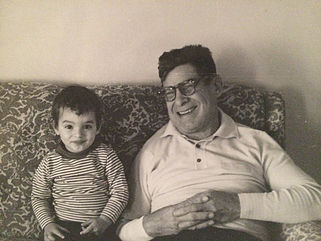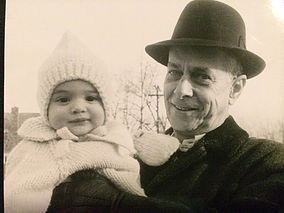I don't recall having any concept of grief as I was growing up. Loss didn't cross my path in any life-altering way until far into my adulthood.
One of my grandfathers died before I was old enough to understand what it meant to lose him, and my brother and I did not attend the funeral. At the time I had no sense of how the loss affected my parents, although I know now that they must have been grieving, particularly my mother because it was her father. I sensed my mother's grief for the first time years later, when I was 11 or 12, as we drove on the highway toward my grandparents' house in Bethesda, MD. My dad, who often tape-recorded stories and conversations during family get-togethers, had put one of his homemade cassettes into the car stereo deck. All of a sudden my late grandfather's voice came over the car speakers. My mother burst into tears. Sitting in the back seat, my brother and I turned toward each other wide-eyed and silent, not having the slightest idea how to react or help.
My grandmothers both lived well into their 80s, and my other grandfather into his mid-90s. At each of their funerals, although I felt great sadness, I felt even greater gratitude for having enjoyed so many years with them, years piled up with proof after proof of how much they loved us grandchildren. The mix of tears and laughter felt balanced, and in some sense logical - at least according to the assumptions about loss and grief I made at the time.
Those assumptions were crushed by the earthquake of my brother's sudden untimely death. The aftershocks are still coming, and not just from my own ongoing grief journey. Many come from what others tell me about their own experiences of loss and grief. My eyes have been opened.
Some people come to a place of peace and acceptance faster than others. Some throw themselves into work and put their grieving off for months, years, even decades, until the time comes when they are somehow able to face it. Some tumble deeply into despair and feel compelled to live there for a while. Some experience relief - maybe because the deceased had been suffering unbearable mental or physical pain, or perhaps because the relationship had inescapable difficulties (when conflict dominates a relationship, relief is not an uncommon reaction to loss). Some self-soothe or self-medicate with any of a variety of tonics - alcohol or drugs, lots of food or denial of food, a heavy-duty exercise regimen, music, movies, going out, staying in, taking risks, taking time away. Some talk about it all the time, some stop talking. Some surround themselves with photographs, some put all the photographs in boxes and shut them up in a closet. Grief isn't all or nothing -- an authentic grief experience can occur at any point on the continuum between extremes.
The more I communicate with people about grief, the more I see how each experience is as individual as a snowflake. Even as they are all formed from the same substance -- the water of loss -- each snowflake of grief has a unique shape, travels a unique path, and follows a unique timeline. If we can release assumptions and judgment and let the snowflakes fall as they may, we can allow acceptance and love to come in and cushion the fall.
A previous version of this post entitled Grief looks like...anything you can imagine was originally published at Life Without Judgment by Sarah Lyman Kravits at www.lifewithoutjudgment.com.

